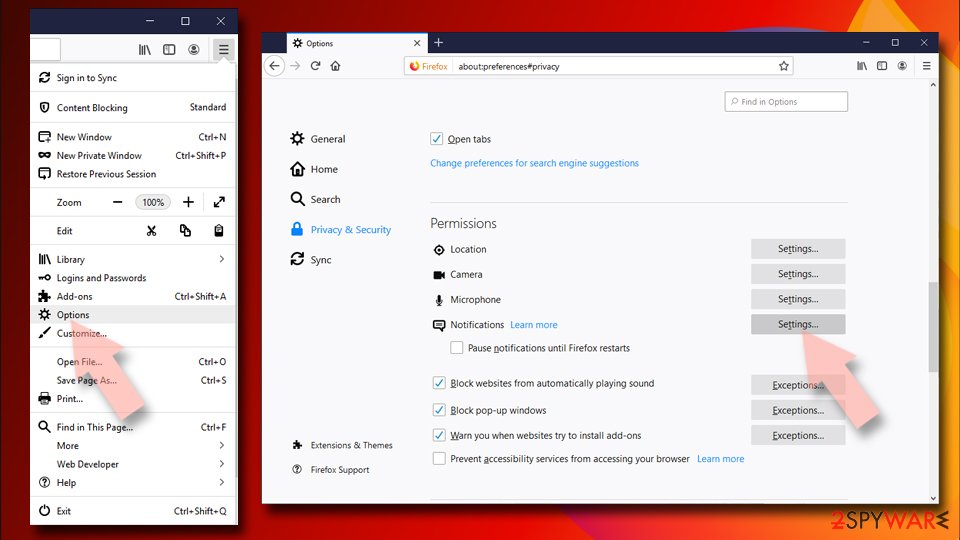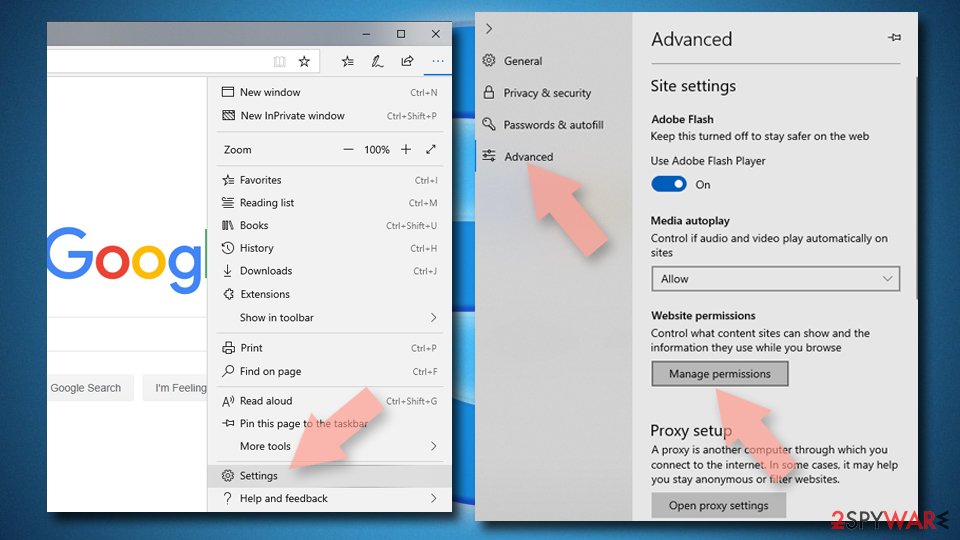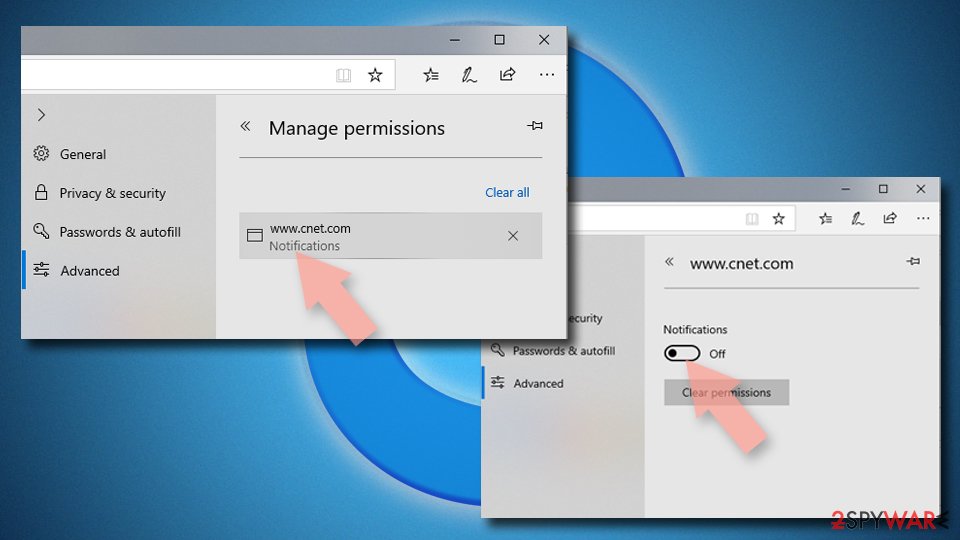News-dufeji.cc ads (scam) - Free Guide
News-dufeji.cc ads Removal Guide
What is News-dufeji.cc ads?
News-dufeji.cc notifications might flood your screen with misleading ads

When you open your browser and type in a web address or click on a bookmark, you are guaranteed to land on a website you were expecting. However, not all links work as one might have expected, and redirects might lead to sites of dubious nature – News-dufeji.cc is one of them. In most cases, redirects to it occur after people click on a malicious link somewhere else or when their systems are infected with an aggressive type of adware.
After accessing the site, users are immediately shown two elements that could potentially mislead them immediately – a push notification prompt that shows up at the top-left corner of the screen and a background picture, which also includes a fake message. The fake messages that accompany the main page on the site can differ, users might be presented with one of the following variations:
- Click Allow if you are not a robot
- If you are 18+, tap Allow
- The download is ready! Click Allow to download the file
- Click “Allow” to continue streaming, etc.
Since users believe that the push notification prompt is not something that it actually is, they proceed with allowing notifications. Nothing really happens after that, and they are forwarded to a similar website that asks for exactly the same (e.g., Ultimate-sweepstakes.biz, Fadverdirect.com, or Ucationininanceen.xyz), where they could be tricked once again.
In fact, even clicking “Block” forwards people to other malicious places, so it is not recommended to use it either. Instead, it is best to leave the page by closing down the browser tab. Unfortunately, there are plenty of users who do fall for this trick, which results in them later receiving News-dufeji.cc ads.
These push notifications start showing up at random times, regardless of what users are currently doing – streaming videos or browsing their favorite websites. What makes it even more annoying is that the pop-ups are shown on top of everything else, and they need to be closed manually with the “X,” otherwise they hang on for a while.
At this point, people might actually click the link and end up redirected to malware-laden, phishing, spoofing, and similar sites. Thus, we recommend avoiding any links because the websites they lead to could be dangerous. Instead, you should eliminate these ads, as we explain below.
| Name | News-dufeji.cc |
|---|---|
| Type | Push notifications, ads, pop-ups, scam |
| Appearance | Pop-ups start showing at some point after the “Allow” button is pressed within the notification prompt |
| Symptoms | Pop-up notifications are shown on a desktop at random times |
| Risks | Ads and links to sites displayed by the website might be dangerous: users might suffer from monetary losses, install malware or potentially unwanted programs on their systems, or disclose their sensitive data to cybercrooks |
| Removal | You can disable notifications via browser settings; in case you experience more ads and redirects to suspicious sites, you should check your system with software like SpyHunter 5Combo Cleaner for adware infection |
| Additional steps | Cleaning web browsers is just as important when dealing with potentially unwanted programs. If you would like a quick solution, we recommend going for FortectIntego or following the steps at the bottom of this post |
Push notifications explained
Initially, push notifications were shipped in 2015 for desktops, although the feature already existed on mobile phones as early as 2009 (system notifications were around for many years now, although they are not completely the same). Maybe because the implementation is relatively new, not many people had to deal with them that much, and there's plenty of misconceptions surrounding them.
First of all, they are not the same as pop-up ads that users encounter after they enter some particular website. Once enabled through a website, they can show up at any time independently of which website is currently being visited. While legitimate sites do not bother users with overall aggressive notifications, News-dufeji.cc, and many others, would.
If you have been tricked by fake alerts and enabled notifications from a website that shows you malicious ads, you can undo this decision easily, as long as you access the browser settings.

How to get rid of News-dufeji.cc ads?
Many users who start seeing suspicious ads automatically assume that the activity is related to malware or adware. However, push notifications are a browser feature and are not malicious in themselves. It can be abused to show malicious content to users, hence the conclusion of infection makes sense.
However, anti-malware software cannot remove these pop-ups, as you need to access the browser settings and deny particular website access to your desktop. The instructions below can be used to deny or allow notifications for any other website, be it legitimate or not.
Google Chrome:
- Open Google Chrome browser and go to Menu > Settings.
- Scroll down and click on Advanced.
- Locate the Privacy and security section and pick Site Settings > Notifications.
- Look at the Allow section and look for a suspicious URL.
- Click the three vertical dots next to it and pick Block. This should remove unwanted notifications from Google Chrome.
![Stop notifications on Chrome PC 2 Stop notifications on Chrome PC 2]()
Mozilla Firefox:
- Open Mozilla Firefox and go to Menu > Options.
- Click on Privacy & Security section.
- Under Permissions, you should be able to see Notifications. Click the Settings button next to it.
![Stop notifications on Mozilla Firefox 1 Stop notifications on Mozilla Firefox 1]()
- In the Settings – Notification Permissions window, click on the drop-down menu by the URL in question.
- Select Block and then click on Save Changes. This should remove unwanted notifications from Mozilla Firefox.
![Stop notifications on Mozilla Firefox 2 Stop notifications on Mozilla Firefox 2]()
Safari:
- Click on Safari > Preferences…
- Go to the Websites tab and, under General, select Notifications.
- Select the web address in question, click the drop-down menu and select Deny.
![Stop notifications on Safari Stop notifications on Safari]()
MS Edge:
- Open Microsoft Edge, and click the Settings and more button (three horizontal dots) at the top-right of the window.
- Select Settings and then go to Advanced.
- Under Website permissions, pick Manage permissions and select the URL in question.
![Stop notifications on Edge 1 Stop notifications on Edge 1]()
- Toggle the switch to the left to turn notifications off on Microsoft Edge.
![Stop notifications on Edge 2 Stop notifications on Edge 2]()
MS Edge (Chromium):
- Open Microsoft Edge, and go to Settings.
- Select Site permissions.
- Go to Notifications on the right.
- Under Allow, you will find the unwanted entry.
- Click on More actions and select Block.
![Stop notifications on Edge Chromium Stop notifications on Edge Chromium]()
Internet Explorer:
- Open Internet Explorer, and click on the Gear icon at the top-right of the window.
- Select Internet options and go to the Privacy tab.
- In the Pop-up Blocker section, click on Settings.
- Locate web address in question under Allowed sites and pick Remove.
![Stop notifications on Internet Explorer Stop notifications on Internet Explorer]()
Beware of dangerous websites
In most cases, people do not find themselves on shady websites all of a sudden – there is a reason for it. This usually occurs when users browse suspicious or high-risk websites. They are commonly filled with misleading links, which might sometimes be dangerous.
For example, fake “Download” buttons on sites that promote illegal software downloads could be the reason for a redirect to News-dufeji.cc, or an even more dangerous site. Likewise, executables from such sites might not be what they initially seem – software cracks commonly distribute malware such as Iisa ransomware. So, make sure you stay away from these.
Even if you end up on a deceptive website, please do not interact with it and simply leave it. It is true that, in some cases, when the system has vulnerable[1] software installed, malware could be proliferated automatically, without user interaction. That's why it is important to keep your system's software updated at all times.
Likewise, redirects to suspicious sites might be a sign of adware infections, which might cause people to see ads on various websites they go to. It is also more likely to encounter malicious sites while browsing the web. Many people don't even know they have such a potentially unwanted program[2] installed on their system, as they are commonly installed along with freeware without users noticing.
To check for adware, you should perform a full system scan with SpyHunter 5Combo Cleaner, Malwarebytes, or another anti-malware software. This would also check your device for malware and other potentially unwanted programs that could be hiding on your system. If you find your device crashing or suffering from errors afterward, you can try fixing it with the FortectIntego repair tool. The app can also clean your web browsers from cookies[3] and other web data to ensure that no more tracking is being conducted.
How to prevent from getting adware
Stream videos without limitations, no matter where you are
There are multiple parties that could find out almost anything about you by checking your online activity. While this is highly unlikely, advertisers and tech companies are constantly tracking you online. The first step to privacy should be a secure browser that focuses on tracker reduction to a minimum.
Even if you employ a secure browser, you will not be able to access websites that are restricted due to local government laws or other reasons. In other words, you may not be able to stream Disney+ or US-based Netflix in some countries. To bypass these restrictions, you can employ a powerful Private Internet Access VPN, which provides dedicated servers for torrenting and streaming, not slowing you down in the process.
Data backups are important – recover your lost files
Ransomware is one of the biggest threats to personal data. Once it is executed on a machine, it launches a sophisticated encryption algorithm that locks all your files, although it does not destroy them. The most common misconception is that anti-malware software can return files to their previous states. This is not true, however, and data remains locked after the malicious payload is deleted.
While regular data backups are the only secure method to recover your files after a ransomware attack, tools such as Data Recovery Pro can also be effective and restore at least some of your lost data.
- ^ Thomas Holt. What Are Software Vulnerabilities, and Why Are There So Many of Them?. Scientific American. Science magazine.
- ^ Chris Hoffman. PUPs Explained: What is a “Potentially Unwanted Program”?. How-to Geek. Site that explains technology.
- ^ HTTP cookie. Wikipedia. The free encyclopedia.








